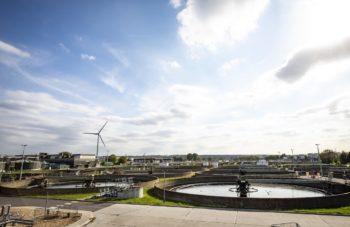Competition: Breakthrough 1
Amount awarded: £6,260,000
Led by: Thames Water
Partners: Dŵr Cymru Welsh Water, University of South Wales, South West Water, United Utilities, Scottish Water, Northumbrian Water, Yorkshire Water, Southern Water, Severn Trent, Uisce Éireann
Project Completion date: February 2028
Water cycle tag: Waste Water Treatment and Recycling
See project updates on the Thames Water website.
This initiative been awarded more than £6 million to decarbonise wastewater treatment – reducing nitrogen oxide emissions and recovering beneficial resources including phosphorus and nitrogen. The water industry consumes between two and three per cent of electricity produced in the UK and around 55 per cent of this – the equivalent of powering over 1.2 million homes – is linked to the processing of wastewater. The project is developing solutions that would reduce the energy required for wastewater treatment.
—
Update from the project (July 2025)
Thames Water plans to begin operating the anaerobic wastewater treatment pilot plant in August 2025. Applying learnings from the Dŵr Cymru Welsh Water trial at Builth Wells, Thames Water will shorten the acclimatisation period for the pilot plant to ensure maximum treatment performance is achieved as rapidly as possible. Once operational, treatment performance and biogas yield will be monitored through liquid and gas phase sensors. In preparation for future regulatory drivers, the University of South Wales will also monitor emerging contaminants through the treatment process. The University of South Wales have completed their trials with adsorbent and ion exchange resins for the removal of phosphate and ammonium from wastewater. The learnings from this research have been integrated into Thames Water’s design for an ion exchange system for the removal of nutrients from the anaerobic wastewater treatment pilot plant. Thames Water have commenced planning for the demonstration-scale plant in the final phase of the project. Key influent characteristics and health and safety requirements have been outlined to guide site selection. Internal and external experts have also been engaged to identify suitable technologies to utilize the biogas produced to maximise the likelihood a positive energy balance can be achieved.


